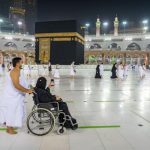
The General Presidency for the Affairs of the Two Holy Mosques, represented by the Agency for the Women’s Development Affairs, has managed to facilitate performance of Umrah and prayer at the Grand Mosque in Makkah for more than a million women during the period since the gradual resumption of Umrah service and visit to the Two Holy Mosques on October 4.
Dr. Camellia Bint Muhammad Al-Daadi, assistant undersecretary for women’s administrative and service affairs at the agency, said that the presidency received 26,209 women Umrah pilgrims in the first phase of the resumption of Umrah service between October 4 and 18.
She added the number of women pilgrims in the second phase from October 18 to October 31. The total number of women who performed Umrah in the second and third phases reached 326,603, while those who offered prayers in the Grand Mosque were 669,818 women.
Al-Daadi confirmed the success of the three stages of Umrah, and the commitment of conferences and prayer rooms to all precautionary measures at the Grand Mosque, as the best services were provided to ensure the safety of visitors and pilgrims of the Grand Mosque.
“This was made possible in line with the continuous follow-up of Sheikh Abdul Rahman Al-Sudais, head of the presidency, and under the supervision of Dr. Al-Anoud Bint Khalid Al-Aboud deputy head of the presidency for women’s development affairs.”
“All these three phases have been successful, in accordance with the aspirations of the rulers, to provide the best services and facilities so as to ensure the safety and comfort of the pilgrims and visitors to the Grand Mosque,”she added.
Before the pandemic
Millions of Muslims from around the world usually travel to Saudi Arabia for the Umrah and Hajj pilgrimages. The two share common rites but the Hajj, held once a year, is a lengthier ritual that a once-in-a-lifetime duty for Muslims.
Saudi Arabia suspended Umrah in March and significantly downsized the Hajj pilgrimage in July by only allowing about 10,000 pilgrims, all in response to the COVID-19 pandemic.
For all Umrah pilgrims whose visas has ended, and they are are late to leave to their countries,,
Take the advantage of the exemption from legal effects and financial penalties for the delay, before the deadline expires at the end of Saturday 28/3/2020 pic.twitter.com/Y4qF4lzl9Z— الجوازات السعودية (@AljawazatKSA) March 27, 2020
All visas from abroad that have been filed through accredited agents and the offices of certified Umrah companies have been accepted, provided they fulfilled the necessary requirements.
Saudi Arabia, which held a largely symbolic Hajj earlier this year limited to domestic worshippers, began allowing citizens and residents to perform the Umrah in October at 30-percent capacity, or 6,000 pilgrims a day.
More than 1,300 hotels and hundreds of stores buzzed around the clock to cater to pilgrims visiting the holy cities of Mecca and Medina. Those have been largely empty in recent months.
Worshippers are no longer allowed to touch the Kaaba – a stone structure draped in black cloth embroidered in gold with verses from the Quran. The Kaaba is the most sacred structure in Islam and the direction that Muslims face to pray; touching it is considered a great honour that pilgrims treasured in the past.
Umrah during COVID-19
Sheikh Abdulrahman Al Sudais, president of the General Presidency for the Affairs of the Two Holy Mosques called for an increase in the number of paths around the Kaaba to accommodate the increased number of pilgrims performing Umrah and to allocate paths for the elderly and people with disabilities, as well as paths for those in wheelchairs.
Those applying for Umrah from abroad must be between 18 and 50 years old, in accordance with the requirements of the Ministry of Health. They must also submit their COVID-19 negative RT-PCR test, issued by a reliable laboratory and taken 72 hours prior to leaving for Saudi Arabia.
Pilgrims must book through the Eatmarna application to perform Umrah, pray in the Grand Mosque, visit the Prophet’s Mosque and pray in the Prophet’s Sacred Chamber in the Prophet’s Mosque, in accordance with the regulations and available capacity. Each pilgrim must also have confirmed return air tickets.
Pilgrims who have booked only an appointment for prayer cannot perform Umrah because they will not be able to enter the Tawaf area.





